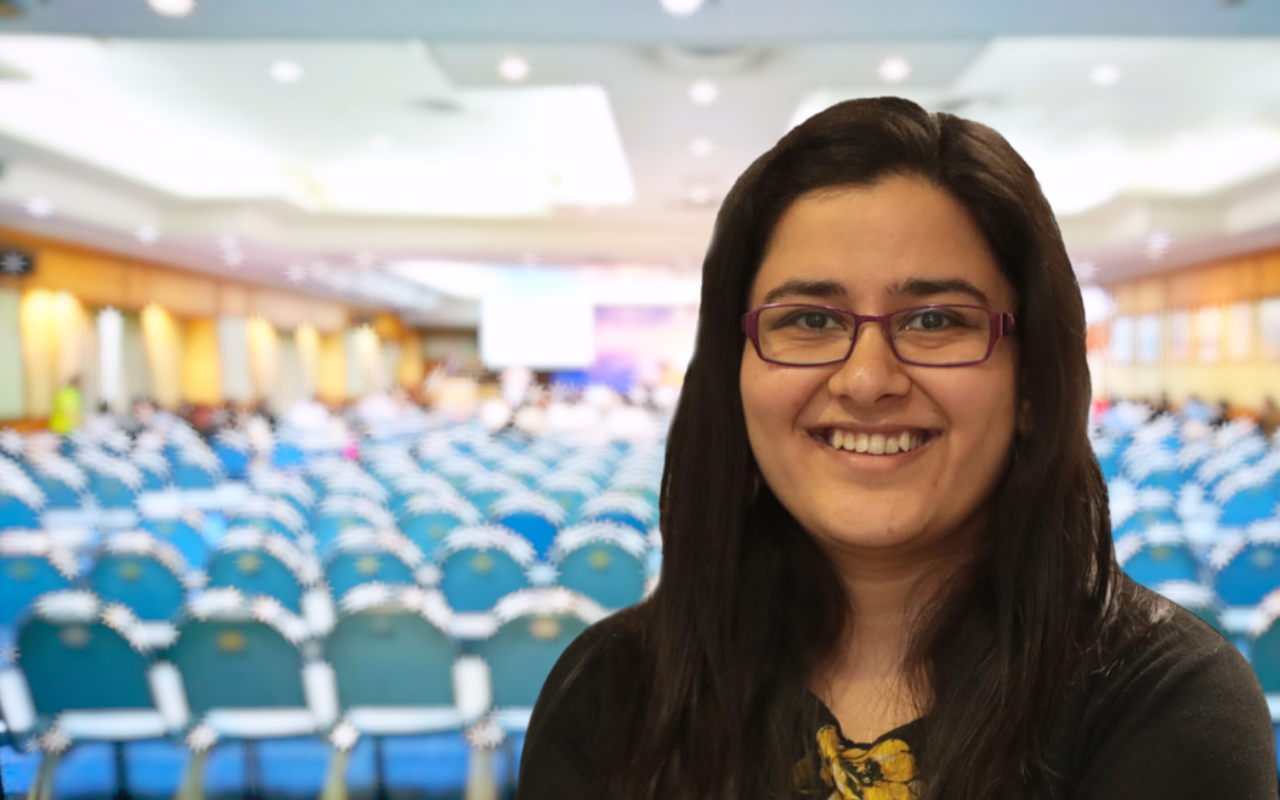Medical conferences are a great opportunity to connect with other doctors and even win raffles, but more needs to be done to make them inclusive for doctors with young children, writes Dr Aajuli Shukla.
Ever since the announcement was made regarding changes to the continuing professional development (CDP) requirements, doctors have been navigating ways to meet the new requirements regarding educational activities, reviewing performance and outcomes.
Traditionally, most general practitioners have used conference attendances as a way to gain CPD points in the past, as most GP-centric conferences have always had a strong educational focus.
Although topics and sessions are often chosen for their educational merit to meet a doctor’s gaps in knowledge about a topic, in reality, sessions are chosen for their ease of access and the times it is available that suit a busy professional GP’s diary.
The coronavirus disease 2019 (COVID-19) pandemic had several impacts, and these were felt across the educational and conference spheres too.
Several switched to online modes of delivery and, although appropriate, most of us suddenly found it difficult to attend several hours of education on top of weekly COVID-19 updates with the inevitable burnout among doctors that followed the pandemic (here and here).
Furthermore, it was interesting to see how difficult it is to pay attention to a lecture when there is no morning tea, lunch, or afternoon tea with its associated socialising to look forward to.
GPs often work on their own in their rooms, and while most practices are quite cohesive and active socially, it can still feel like quite a lonesome job without the automatic camaraderie that comes from working in a hospital team.

The social element
Conferences are so much more than just information and education sessions. As large as Sydney is as a city, at most conferences, one inevitably bumps into colleagues from medical school/training or from local practices.
The regular breaks and meals almost make it like a veritable catch-up for people who don’t have the time or energy to plan catch-ups.
I often come out of most conferences invigorated not just from an educational perspective (come at me asthma, I have every tool in the inhaler toolbox to throw at you now), but from socialising with our fellow colleagues.
It gives me hope for our profession, and networking always leads to discussions about new ideas and novel concepts to try in clinical management.
Being careful with what session you choose
The trick with conferences, especially the ones with several learning modules on offer that can be CPD points heavy, is to find the perfect balance between filling knowledge gaps and ensuring that the post conference activities for the chosen sessions aren’t too onerous.
It can often be very tempting to sign up to several learning modules that offer points for reviewing performance, but these are now hours-based and can mean a significant amount of work after the conference that an attendee might not have time for (here).
The compulsory learning plan that accompanies CPD can be an important tool in identifying and reflecting on knowledge gaps, but often it can be as simple as picking sessions that are run by a specialist and not necessarily sponsored by a pharmaceutical organisation.
There is nothing worse than signing up for a session on migraine management and learning far too late, when the lights in the lecture room have dimmed and you are ensconced between several attendees, that it is specifically about one “wonder drug” that rules them all.
Raffles in the hall
Another aspect of large conferences worth mentioning is the “exhibition hall” that one can visit during the breaks.
Depending on the conference they often have educational or research-based posters or, as is usually the case, several pharmaceutical and non-pharmaceutical marketing stands.
Now, the chances of me winning a Powerball lottery are less than the chances of us getting adequate chronic care funding, but I have already entered and won several raffles at conferences.
It’s a statistical game really.
The rest of Australia versus a large group of GPs.
Although it can be fun signing up to these competitions, one must also be aware that it comes with the “signing up” part that can lead to quite a bit of spam.
Getting the swag
Another aspect of exhibition halls, as the youngsters would put it, is conference “swag”. All the branded cups, pens, highlighters, stationery and samples one can procure from several stands.
It can be quite addictive and while we would like to pride ourselves on believing that owning pharmaceutical company branded pens does not affect our prescribing, research often shows us otherwise.
Still, it is another aspect of conferences that has been missed and can be quite entertaining.
My husband and I always try and find out which stand has the best coffee (and freebie) or the most inventive marketing tool.
So far it was a stand for cannabis prescribing that gave away small succulent plants.
I smile even now when I open my mother’s cupboards to make tea, seeing various medically branded mugs.
One for every time she watched my toddler so I could attend a conference.
Which of course brings me to my final point.
Making conferences more equitable
All of this is essentially moot if you are a young female GP with kids who cannot rely on external help to look after her kids to attend conferences on the weekends, which, in fact, makes a significant bulk of the GP workforce (read more here and here).
No conference that I have attended offers a creche, and although they all pose as being child friendly, this is only as long as the child sits quietly for hours on end while all attendees listen to sessions and lectures.
It is this fact that has made the new CPD changes even more inequitable for female medical practitioners who still perform the bulk of child-rearing.
Especially if they do not have parents locally who can help, or are single.
It can be incredibly hard attending the requisite number of hours for educational opportunities even if that activity is online after being in clinic, looking after the kids, and doing a share of the domestic tasks at home.
Conferences provide an excellent opportunity to network and socialise but also attend educational events.
I wonder if there are innovative ways organisers can make it more inclusive.
Dr Aajuli Shukla is a Sydney GP and a deputy medical editor at The Medical Journal of Australia.
The statements or opinions expressed in this article reflect the views of the authors and do not necessarily represent the official policy of the AMA, the MJA or InSight+ unless so stated.
Subscribe to the free InSight+ weekly newsletter here. It is available to all readers, not just registered medical practitioners.
If you would like to submit an article for consideration, send a Word version to mjainsight-editor@ampco.com.au.

 more_vert
more_vert
My preference is for multi-track events. Next month I am attending one conference with ten parallel tracks. If the one I am speaking in gets boring, I can slip out to the one next door. The speaker’s room is also a great place to catch up with people.
Switch to online mode during COVID-19 was the opportunity for conference organizers to try new things, but regrettably many did not. Some of my favorite formats are ones where you get to ask questions of the speaker. One event I attended pre-COVID19 had a room full of tables holding about 9 people, with a speaker at each, and every 10 minutes you moved tables. This format translated easily online. Also curated questions from large audiences works well: you post a question online, others vote on it, then a moderator picks which to be asked.
Event crèche can be available (eg KidzKlub) but then the parents would be asking the organisers who and how the providers were vetted, and who takes responsibility if and when things go wrong: Something medical events organisers often do not have the resources or energy to deal with.
And when crèche is “complementary” it only means the parents involved were not asked to pay out of pocket; you got to wonder if the costs are partially borne by registration fees, event sponsors or other financial support as there is no such thing as “free childcare service” as any parent will attest
A wonderful article. So much truth in Dr Shukla’s observations. I absolutely agree on the aspects of professional and personal camaraderie, and having a creche for the children of GPs of both genders. So said by a retired male GP of over 40 years.
My best recent cpd experience was with the ACCO due to the excellent teaching ratio.
We are attending conferences to learn and improve the way we look after others.. our patients ..
what aboit ourselves? I will be good to see 20-30 min stretching/yoga/meditation sessions prior to or middle of the day or even after a whole day of listening, reading and thinking..
I completely agree, the CPD/conference system favours those without dependents. The recent ACEM winter symposium offered crèche services free of charge so that was a big positive step forwards but an outlier, or hopefully the first of many!
My experience if attending countless conferences, large and small, over the years. The smaller ones generally are more valuable. I found that i learned as much from comments and questions at the end of talks as i did from the talk itself. Conversations at conference dinners, and contacts made were invaluable. I learned to become very selective about the sessions offered to save a lot of wasted time. I looked for practical stuff ; recent advances, “how I do it” etc Meeting up with colleagues from years past was always a pleasure. My advice is be selective about what you attend, interstate or overseas conferences can be combined with a holiday, and accurately document your expenses for tax purposes, and your CME points if this is not automatically done.